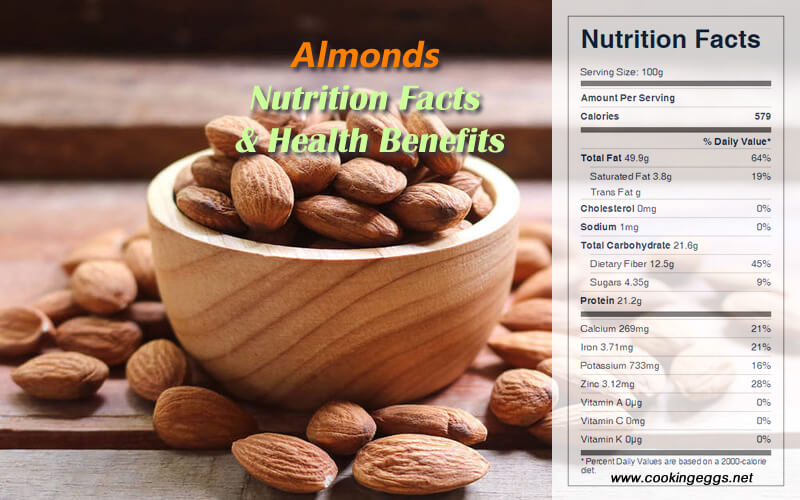Almonds Nutrition Facts & Health Benefits
Almonds are not a true nut! They fall into the category of drupes, or stone fruits, and the portion of the almond that we eat is the seed of the almond fruit. Almonds come from almond trees, much like cherries and plums.
Almonds are a highly concentrated food that is rich in protein, fat, and vital minerals such as zinc, magnesium, potassium, and iron, as well as some B vitamins. Here are the nutritional benefits of almonds.

Nutritional Composition of Almonds
One-fourth cup of raw almonds provides 206 calories, 7.8 g carbohydrate, 7.6 g protein, 17.7 g fat, and 4.4 g dietary fiber.
Almonds are 4% water, 22% carbohydrates, 21% protein, and 50% fat. The almond is a nutritionally dense food, providing a rich source of the B vitamins riboflavin and niacin, vitamin E, and the essential minerals calcium, copper, iron, magnesium, manganese, phosphorus, and zinc. Almonds are a good source of the B vitamins thiamine, B6, and folate, as well as choline and potassium. They also contain substantial dietary fiber, the monounsaturated fat oleic acid, and the polyunsaturated fat linoleic acid. Typical of nuts and seeds, almonds are a source of phytosterols such as beta-sitosterol, stigmasterol, campesterol, sitostanol, and campestanol.
Almonds Nutrition Facts Label
Health Benefits of Almonds
Almonds are a highly concentrated food that is rich in protein, fat, and vital minerals such as zinc, magnesium, potassium, and iron, as well as some B vitamins. Since they are also high in oxalic and phytic acid, which combine with these minerals to carry them out of your body, you should eat them at the same time as vitamin-C rich foods for maximum absorption. Almonds have a reputation as a good source of vitamin E, but they offer so much more. Almond tannins support our gut health and help grow beneficial bacteria.
Almonds are 20% protein, which means they have one-third more protein than eggs.The oil in almonds is soothing, and almond milk is a classic sourdough drink, being both sustaining and soothing. It is recommended by herbalists for respiratory ailments as well as digestive upsets. Almond milk can be combined with barley water for urinary problems.
Almonds are low in carbohydrates, and more than half their carbohydrate content, by weight, is dietary fiber. Though they are rich in fat, it is monounsaturated fat. Studies have suggested that almonds can lower LDL while raising HDL. Almonds are also rich in alpha-tocopherol, vitamin E, the form most easily absorbed by the human body. They provide calcium, magnesium, and potassium—vital for electrolyte balance, which promotes cardiovascular health. Recent research has also found beneficial polyphenols and antioxidants in the brown inner skins of almonds.
Almonds are included as a good source of protein among recommended healthy foods by the US Department of Agriculture. A 2016 review of clinical research indicated that regular consumption of almonds may reduce the risk of heart disease by lowering blood levels of LDL cholesterol.
Like many other tree nuts, almonds possess high levels of vitamin E, which is a key antioxidant that is thought to contribute to the cancer-fighting properties of almonds. The key to this potential benefit is the consumption of the skin of the almond. A study found that the flavonoids found in the skin work synergistically with the vitamin E in the fruit to deliver twice the antioxidant potential as if it was a blanched almond (without skin). Interestingly, there were twenty potent antioxidant flavonoids in almond skins. These include key flavonoids such as catechins from green tea and naringenin found in grapefruit.
Almond tannins are used by our gut microbiota to improve the composition and help grow the beneficial bacteria. One study found improvement in the growth of Bifidobacteria and lactobacillus (good bacteria) species and no change in E. coli or clostridium (bad bacteria). This helps to shift the balance between good bacteria and bad bacteria in the gut. Fiber and other components in almonds and almond skins have potential prebiotic properties.
Almonds have also been studied for their anti-inflammatory potential. Studies have consistently demonstrated the effect on inflammatory markers post-ingestion of almonds. What they found was significantly reduced serum levels of CRP, which is a nonspecific measure of inflammation. The antiinflammatory effects are attributed to their high monounsaturated fatty acid (MUFA) content coupled with the presence of magnesium, arginine, and other phytochemicals.
Health Risk
Almonds may cause allergies or intolerance. Cross-reactivity is common with peach allergens (lipid transfer proteins) and tree nut allergens. Symptoms range from local signs and symptoms (e.g., oral allergy syndrome, contact urticaria) to systemic signs and symptoms including anaphylaxis (e.g., urticaria, angioedema, gastrointestinal and respiratory symptoms).